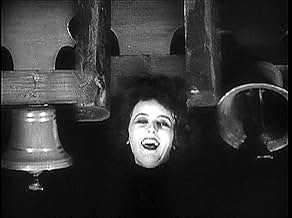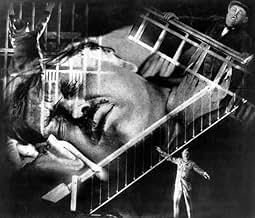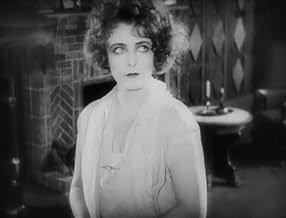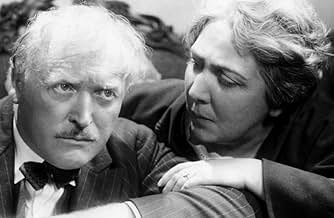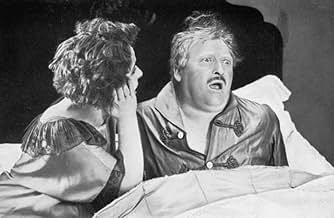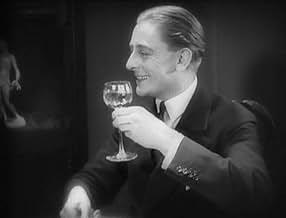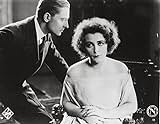VALUTAZIONE IMDb
6,8/10
862
LA TUA VALUTAZIONE
Aggiungi una trama nella tua linguaA scientist is tormented by an irrational fear of knives and the irresistible compulsion to murder his wife.A scientist is tormented by an irrational fear of knives and the irresistible compulsion to murder his wife.A scientist is tormented by an irrational fear of knives and the irresistible compulsion to murder his wife.
- Regia
- Sceneggiatura
- Star
Recensioni in evidenza
There are a lot of important elements the restorers chose to omit from the movie. There are letters that are opened & are supposed to appear on screen for the audience to read. Gone. A man pulls up on a bike delivering a telegram. Gone. All references to the name of the man Martin Fellman are omitted. When he comes home after leaving his key,he sits down in front of the idol. It disappears leaving only a baby image. Gone. His wife see a dog & litter of puppies, She says: "I wish I had a child." Gone. The Murnau people made the movie incoherent by this censorship. Its a disgrace. They had no right to do these changes to the movie as they are not part of the creative process.
Although it has an enormous reputation as a classic example of German Expressionist Cinema, "Secrets of a Soul" turns out to have very few of these pictorial elements. That reputation was obviously built on the opinions of critics who had not actually seen the movie but had referenced the illustration reproduced on the poster. It is not a still from the movie at all, but a composite made up by the publicity department.
Admittedly, we do see the various dreams individuallyand they are even briefly reprizedbut even so, they constitute but an extremely small part of the movie which mostly centers on the well-off but distinctly middle-aged hero's sudden aversion to his young and extremely attractive wife.
I realize that this was obviously not the scriptwriter's intention, as it appears from the flashback that the three participants are roughly the same age. The casting, however, particularly of the 25-year-old Weyher, as well as youngish Jack Trevor, makes nonsense of this supposition. We are forced to accept the movie in the way it appears on the screen, not in the way it was postulated in the minds of the screenwriters.
I suppose you could argue that the dreams are presented in an expressionistic fashion (though I would disagree), but you can't get away from the fact that they display little visual imagination. And in any event, they occupy very little screen time.
As the middle-aged lead, Werner Krauss does extremely well in conveying the domestic disparity he suffers with his young wife. He has obviously been married for at least five or six years and his attitude is not so much loving, as reserved, suspicious, ill-tempered and even resentful. As said, this was probably not the way Neumann and Ross intended, but it's the way Krauss plays the role and, more importantly, the way Pabst has directed it. So what have here is not so much expressionism, as a moderately gripping domestic drama.
Admittedly, we do see the various dreams individuallyand they are even briefly reprizedbut even so, they constitute but an extremely small part of the movie which mostly centers on the well-off but distinctly middle-aged hero's sudden aversion to his young and extremely attractive wife.
I realize that this was obviously not the scriptwriter's intention, as it appears from the flashback that the three participants are roughly the same age. The casting, however, particularly of the 25-year-old Weyher, as well as youngish Jack Trevor, makes nonsense of this supposition. We are forced to accept the movie in the way it appears on the screen, not in the way it was postulated in the minds of the screenwriters.
I suppose you could argue that the dreams are presented in an expressionistic fashion (though I would disagree), but you can't get away from the fact that they display little visual imagination. And in any event, they occupy very little screen time.
As the middle-aged lead, Werner Krauss does extremely well in conveying the domestic disparity he suffers with his young wife. He has obviously been married for at least five or six years and his attitude is not so much loving, as reserved, suspicious, ill-tempered and even resentful. As said, this was probably not the way Neumann and Ross intended, but it's the way Krauss plays the role and, more importantly, the way Pabst has directed it. So what have here is not so much expressionism, as a moderately gripping domestic drama.
G.W. Pabst's fourth film "Geheimnisse einer Seele" (Secrets of a Soul, 1926) was the first film to tackle the subject of psychoanalysis. Even though a controversial subject, the film managed to make a profit. The filmmakers desperately wanted Sigmund Freud himself to join the production as an expert, but Freud strongly refused, not believing that the medium of film could do justice to his psychological theories. In this, he was probably right, since it's doubtful that things would be this neatly spread out in any person's mind.
Werner Krauss plays a bourgeois scientist, who has a wife, 20 years younger than him. There is a murder in their neighbor's apartment, and suddenly Krauss starts to feel an inexplicable fear of knives and also an urge to murder his wife. We have a dream sequence, that is well executed enough, but it doesn't leave any kind of mystery to the film, which tries really hard to be a mystery. Of course we still get to return to it once the protagonist receives psychoanalytical treatment. Doesn't really take Freud to interpret this dream, but maybe people in 1926 weren't yet tired of freudian cliches.
This film looks like a pioneering work, but its greatest value lies in the films that it may have inspired. The dream sequence brings to mind Hitchcock's "Spellbound" (1945), and the depiction of guilt resembled Fritz Lang's "M" (1931) a little. The hold Pabst has over his film is too pedantic, especially towards the end. But one thing is certain, he does really believe in the science that he tries to sell you, and the film's message about how one can heal from psychological illnesses just like any other, is a positive one.
Werner Krauss plays a bourgeois scientist, who has a wife, 20 years younger than him. There is a murder in their neighbor's apartment, and suddenly Krauss starts to feel an inexplicable fear of knives and also an urge to murder his wife. We have a dream sequence, that is well executed enough, but it doesn't leave any kind of mystery to the film, which tries really hard to be a mystery. Of course we still get to return to it once the protagonist receives psychoanalytical treatment. Doesn't really take Freud to interpret this dream, but maybe people in 1926 weren't yet tired of freudian cliches.
This film looks like a pioneering work, but its greatest value lies in the films that it may have inspired. The dream sequence brings to mind Hitchcock's "Spellbound" (1945), and the depiction of guilt resembled Fritz Lang's "M" (1931) a little. The hold Pabst has over his film is too pedantic, especially towards the end. But one thing is certain, he does really believe in the science that he tries to sell you, and the film's message about how one can heal from psychological illnesses just like any other, is a positive one.
I come to this as someone who thinks the presentation of dreams - much more than dreams themselves - imitates the ways we use to structure the self that presents the world to us. Charting the cinematic effort of that is exciting to me.
And well, this is an interesting film to say the least, and from an interesting time. The backstory is that Freud himself approved of it and moreover sent two from his trusted Viennese circle to aid and supervise the UFA production on what would be a rational explication of psychoanalysis. You should know that his were radical , modern ideas in their time and for twenty years had been a sensation. And the Weimar public at large was struggling with deep-seated nightmares of their own, evidenced in Caligari and elsewhere, so it was very receptive to the new science for sleep, and probably every bit as confused about it as the somnambulist in Caligari.
But oh boy, haven't our narrative devices come far since Freud.
In the film, we have suddenly strange , unsettling urges followed by a puzzling nightmare, and then a psychoanalyst sits us down to kindly explain and assuage irrational fear.
Nevermind the obtuse focus on sex and symbolic interpretation of dreams, that was Freud. The emphasis on phallic imagery, the incidental aversion to knives linked to imaginary castration in the patient. Jung would make the transition to a character-based dreamworld, and we are growing out of that too. We are insanely more complicated beings these days than a logic like Freud's can explain, our dreams much more layered, and you can see that in contemporary filmmakers who are dabbling with dream.
We are unsure these days where day begins, that much (night) was certain then. Our dreams also come from movies and TV, from tweets and instagram, and we're beginning to understand what the Buddhist had been saying all along; the mind's function is to project snippets of narrative around a fictional self, and the most loaded dream is no different in mechanism to the most trivial thought. You are always at the center of an illusionary world you have set in motion, but you won't know that without a center in emptiness.
The trigger for it is something to consider though. A murder (by knife) has taken place the day before in the same street, a wife killed by the husband. The same urge somehow surfaces in our guy.
The actual nightmare has dated, along with the logic behind it and German expressionism. It is this eerie confluence of semiconscious machinery that still carries power. It is this aspect of dreaming Pabst would cultivate in later works.
And well, this is an interesting film to say the least, and from an interesting time. The backstory is that Freud himself approved of it and moreover sent two from his trusted Viennese circle to aid and supervise the UFA production on what would be a rational explication of psychoanalysis. You should know that his were radical , modern ideas in their time and for twenty years had been a sensation. And the Weimar public at large was struggling with deep-seated nightmares of their own, evidenced in Caligari and elsewhere, so it was very receptive to the new science for sleep, and probably every bit as confused about it as the somnambulist in Caligari.
But oh boy, haven't our narrative devices come far since Freud.
In the film, we have suddenly strange , unsettling urges followed by a puzzling nightmare, and then a psychoanalyst sits us down to kindly explain and assuage irrational fear.
Nevermind the obtuse focus on sex and symbolic interpretation of dreams, that was Freud. The emphasis on phallic imagery, the incidental aversion to knives linked to imaginary castration in the patient. Jung would make the transition to a character-based dreamworld, and we are growing out of that too. We are insanely more complicated beings these days than a logic like Freud's can explain, our dreams much more layered, and you can see that in contemporary filmmakers who are dabbling with dream.
We are unsure these days where day begins, that much (night) was certain then. Our dreams also come from movies and TV, from tweets and instagram, and we're beginning to understand what the Buddhist had been saying all along; the mind's function is to project snippets of narrative around a fictional self, and the most loaded dream is no different in mechanism to the most trivial thought. You are always at the center of an illusionary world you have set in motion, but you won't know that without a center in emptiness.
The trigger for it is something to consider though. A murder (by knife) has taken place the day before in the same street, a wife killed by the husband. The same urge somehow surfaces in our guy.
The actual nightmare has dated, along with the logic behind it and German expressionism. It is this eerie confluence of semiconscious machinery that still carries power. It is this aspect of dreaming Pabst would cultivate in later works.
There are many people who consider G. W. Pabst to be the finest director of German silent cinema. I am not one of them. I find his movies to be poorly paced and lacking in visual interest. They are kept afloat by their adult subject matter and by the performances of his female stars (Greta Garbo in THE JOYLESS STREET, Edith Jehanne and Brigitte Helm in THE LOVE OF JEANNE NEY, and of course Louise Brooks in PANDORA'S BOX and DIARY OF A LOST GIRL). A prime example of this is THE WHITE HELL OF PILZ PAULU co- directed by Pabst and Arnold Fanck and starring Leni Riefenstahl. Compare the dramatic scenes with the rest of the film and I think you'll see my point which brings me to SECRETS OF A SOUL.
This was Pabst's follow-up to the highly successful JOYLESS STREET (1925). The subject matter and the film's raison d'etre is the "new" subject of psychoanalysis. The breakdown of the protagonist and the fascinatng dream sequences (designed by Erno Metzner) are true to the film's Expressionist roots while the unfolding analysis of his problems are still of interest to a modern audience. There is also an amazing central performance from Werner Krauss as the patient undergoing analysis that really holds the movie together.
Krauss may be the finest German performer from that time period. He has a greater range than Emil Jannings and is less stylized than Conrad Veidt. Unfortunately very little of his work survives and his most famous role (CABINET OF DR CALIGARI) doesn't do him justice. This film does. Also check out his Iago in the 1922 version of OTHELLO and Orgon in the 1925 TARTUFFE (both opposite Jannings). SECRETS OF A SOUL is part of the Kino set GERMAN EXPRESSIONISM which contains 3 other films (CABINET OF DR CALIGARI, WARNING SHADOWS, and THE HANDS OF ORLAC). All of these films can be obtained separately although if you don't have the others I highly recommend the set...For more reviews visit The Capsule Critic.
This was Pabst's follow-up to the highly successful JOYLESS STREET (1925). The subject matter and the film's raison d'etre is the "new" subject of psychoanalysis. The breakdown of the protagonist and the fascinatng dream sequences (designed by Erno Metzner) are true to the film's Expressionist roots while the unfolding analysis of his problems are still of interest to a modern audience. There is also an amazing central performance from Werner Krauss as the patient undergoing analysis that really holds the movie together.
Krauss may be the finest German performer from that time period. He has a greater range than Emil Jannings and is less stylized than Conrad Veidt. Unfortunately very little of his work survives and his most famous role (CABINET OF DR CALIGARI) doesn't do him justice. This film does. Also check out his Iago in the 1922 version of OTHELLO and Orgon in the 1925 TARTUFFE (both opposite Jannings). SECRETS OF A SOUL is part of the Kino set GERMAN EXPRESSIONISM which contains 3 other films (CABINET OF DR CALIGARI, WARNING SHADOWS, and THE HANDS OF ORLAC). All of these films can be obtained separately although if you don't have the others I highly recommend the set...For more reviews visit The Capsule Critic.
Lo sapevi?
- QuizSigmund Freud, whose book "The Interpretation of Dreams" largely influenced this film, was approached to serve as a consultant on psychoanalysis. Freud declined, believing that film could not capture the complexities of the science of psychoanalysis.
- Versioni alternativeThere is an Italian edition of this film on DVD, distributed by DNA Srl: "I MISTERI DI UN'ANIMA (1926) + OMBRE AMMONITRICI (1923)" (2 Films on a single DVD), re-edited with the contribution of film historian Riccardo Cusin. This version is also available for streaming on some platforms.
- ConnessioniEdited into Die Geschichte des erotischen Films (2004)
I più visti
Accedi per valutare e creare un elenco di titoli salvati per ottenere consigli personalizzati
Dettagli
- Tempo di esecuzione
- 1h 37min(97 min)
- Mix di suoni
- Proporzioni
- 1.33 : 1
Contribuisci a questa pagina
Suggerisci una modifica o aggiungi i contenuti mancanti

